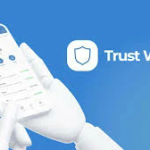# Can Your Trust Wallet Be Hacked? A Deep Dive Analysis
## Introduction to Trust Wallet
In the evolving landscape of cryptocurrency and digital assets, Trust Wallet stands out as one of the most popular mobile wallets. Launched in 2017 and later acquired by Binance, Trust Wallet provides users a secure platform for managing a wide variety of cryptocurrencies. Unlike centralized exchanges, Trust Wallet operates on a decentralized model, which gives users full control over their private keys and assets. However, this decentralization comes with its own set of security challenges.
## Understanding Blockchain Security
To comprehend the vulnerability of wallets like Trust Wallet, it’s essential to acknowledge the security mechanisms inherent in blockchain technology. Blockchain operates on a decentralized ledger system and involves cryptographic methods for securing transactions. While the blockchain itself is robust and typically resistant to attacks, vulnerabilities can emerge in the applications built on top of these networks, including wallets.
## The Role of Private Keys
At the core of any cryptocurrency wallet is the concept of private keys. Private keys are secret codes that grant access to the funds within a wallet. Trust Wallet’s decentralized nature means that users hold their private keys, making them responsible for keeping them secure. If someone gains unauthorized access to a user’s private key, they can fully control the associated funds. This highlights a crucial point: while the underlying blockchain may be secure, user practices and wallet security measures are vital in protecting assets.
## Potential Security Threats
Despite its advantages, Trust Wallet faces a range of potential security threats:
### Phishing Attacks
Phishing attacks remain one of the most common ways wallets can be compromised. These attacks often take the form of deceptive emails or websites that impersonate Trust Wallet or other legitimate services, tricking users into revealing their private keys or recovery phrases.
### Malware and Keyloggers
Another significant threat comes from malware, including keyloggers and trojans that can infiltrate a user’s device. If a user downloads malicious software, it might monitor their activities and capture sensitive information, including private keys or recovery phrases.
### Social Engineering
Social engineering attacks, where cybercriminals manipulate users into divulging sensitive information, are also prevalent. These can occur through various avenues, including deceptive messages or even phone calls, tricking users into revealing their security credentials.
## Trust Wallet Security Features
Trust Wallet incorporates a range of security features designed to protect user assets:
### Biometric Authentication
Many mobile devices today offer biometric authentication features like facial recognition or fingerprint scanning. Trust Wallet leverages these capabilities to add an additional layer of security, ensuring that only the rightful owner can access their wallet.
### Secure Backup
Trust Wallet encourages users to back up their wallets using a recovery phrase—a series of words generated when the wallet is created. This phrase is crucial for restoring access if the device is lost or compromised. However, it’s essential that users store this phrase securely and not share it with anyone.
### Peer-to-Peer Transactions
Trust Wallet enables users to conduct peer-to-peer transactions, which reduces the need to interact with potentially insecure platforms, thus minimizing the risk of falling victim to phishing attacks or scams.
## Best Practices for Wallet Security
To maximize the security of Trust Wallet and similar platforms, users should adopt best practices:
### Always Keep Software Updated
Developers frequently release updates to patch vulnerabilities and improve security. Users should ensure that Trust Wallet is updated to the latest version, which may include critical security features.
### Enable Additional Security Measures
Where available, users should enable any additional security measures such as two-factor authentication (2FA) or wallet-specific security features to add another layer of protection.
### Use Strong Passwords

When creating passwords or PINs for their wallets or related accounts, users should opt for strong, complex combinations to thwart potential unauthorized access.
### Educate Yourself on Phishing Scams
Users must stay informed about the latest phishing tactics and scam trends. Being aware of common signs of phishing attempts can significantly lower the chance of falling victim to these schemes.
## The Implications of Hacks in the Crypto Space
When a wallet or exchange gets hacked, the implications extend beyond the immediate financial loss:
### Market Trust
Hacks contribute to a broader sense of insecurity within the cryptocurrency market. Frequent incidents can deter new users from participating, and this erosion of trust can hinder market growth.
### Regulation
Continued security breaches in the crypto space could lead to increased regulatory scrutiny. Governments may impose stricter regulations on crypto transactions and wallet providers to protect consumers, which could stifle innovation.
### Loss of Assets
For individuals utilizing Trust Wallet or any wallet, the loss of assets due to hacks is often irreversible. Unlike traditional banking systems, cryptocurrencies typically do not offer recourse for stolen funds, emphasizing the importance of personal security measures.
## Conclusion: The Final Word on Trust Wallet’s Security
In conclusion, while Trust Wallet provides a secure and user-friendly platform for managing cryptocurrencies, it is not without vulnerabilities. The decentralized nature of Trust Wallet means that the responsibility for security lies largely with the user. By understanding the potential risks and implementing best practices, individuals can improve their chances of safeguarding their digital assets.
In the ever-evolving world of cryptocurrency, being educated about security threats and proactive in protecting one’s assets is paramount. As technology and tactics continue to develop, staying informed and vigilant remains the best defense against potential hacking attempts. Trust Wallet can be a safe haven for cryptocurrencies, but this safety is only as reliable as the user’s commitment to security practices.


